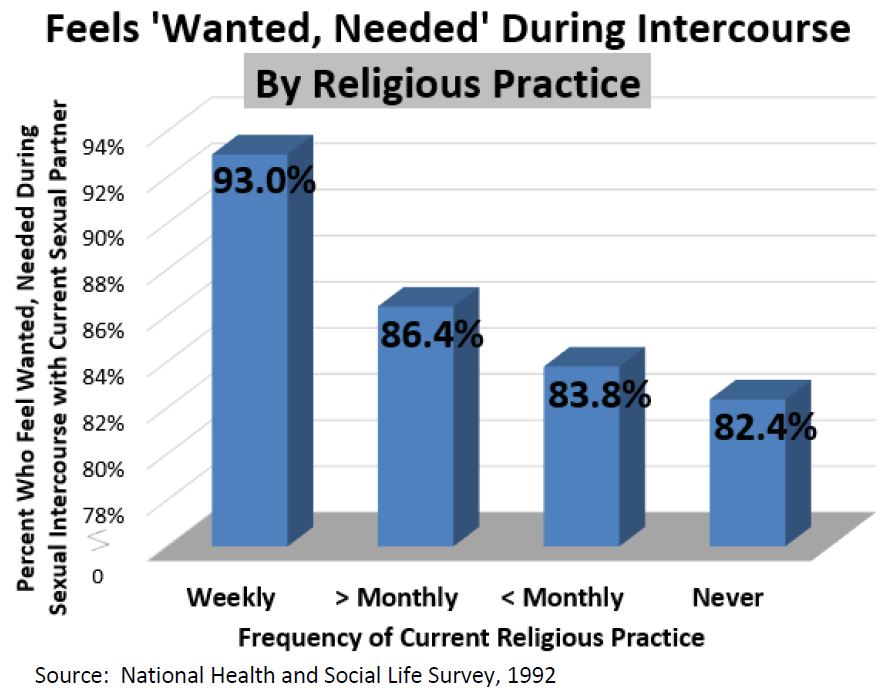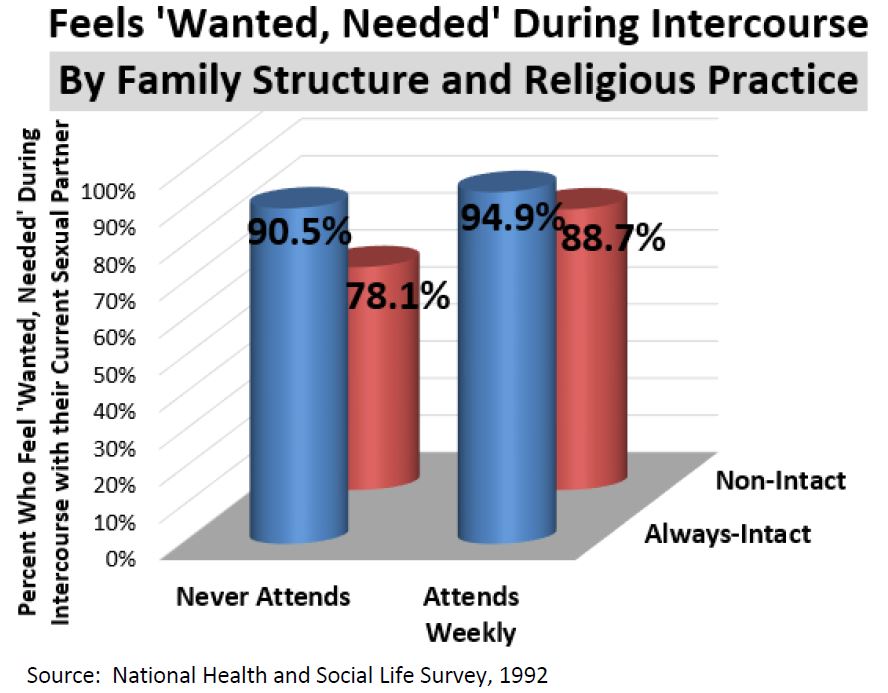Click Here to download “Feels Wanted, Needed During Sexual Intercourse by Family Structure and Religious Practice”
Feels Wanted, Needed During Sexual Intercourse by Family Structure and Religious Practice
Adults aged 18 to 59 in intact marriages who worshiped weekly were most likely to report feeling wanted and needed during intercourse with their current sexual partner, according to the National Health and Social Life Survey (1992), the most detailed analysis of sexual behavior in America.
[1]
Family Structure: Those in always-intact marriages were most likely to report feeling wanted and needed during intercourse (92 percent). These feelings were less prevalent in non-intact family structures and among singles: 89 percent of those who were divorced and remarried report feeling wanted and needed; 80.8 percent of those who were divorced or separated report feeling wanted and needed and 73.2 percent of those who were always single reported feeling wanted and needed during intercourse with their current sexual partner.
 Religious Practice:
Religious Practice: Those who worshiped weekly were most likely to report feeling wanted and needed during intercourse with their current sexual partner (93 percent), followed by those who worshiped less than weekly but at least monthly (86.4 percent), those who worshiped less than monthly (83.8 percent), and those who never worshiped (82.4 percent).
 Family Structure and Religious Practice Combined:
Family Structure and Religious Practice Combined: Those in intact marriages who worshiped weekly were most likely to report feeling wanted and needed during intercourse (94.9 percent). Those in intact marriages who never worshiped (90.5 percent) and those in non-intact family structures or who were single who worshiped weekly (88.7 percent) were less likely to feel wanted and needed by their current sexual partner, and those in non-intact family structures or who were single who never worshiped (78.1 percent) were even less so.
 Related Insights from Other Studies:
Related Insights from Other Studies: A Chinese study of 4,769 female university students found that, of the students who had had sexual intercourse, at their first intercourse 19.8 percent experienced sex under emotional pressure and 4.3 percent were violently coerced. However, religion may be protective against unwanted intercourse, as religious students were less likely to experience coercion at first sexual intercourse.
[2]
Forced sexual intercourse can cause or exacerbate various psychological problems. Analysis of data from the 1987 National Survey of Children found that white females 18 to 22 years of age who reported being forced to have sexual intercourse were found to have a lower internal locus of control, have higher depression scores, and need more psychological attention than those who did not report forced intercourse.
[3]
[1] These charts draw on data collected by the 1992 National Health and Social Life Survey
[2] Yan Hong, et al., “Coerced First Sexual Intercourse Among Female Chinese College Students,”
Chinese Journal of Public Health, January 2007.
[3] Brent C. Miller, Bruce H. Monson and Maria C. Norton, “The Effects of Forced Sexual Intercourse on White Female Adolescents,”
Journal of Child Abuse and Neglect 19, no. 10 (October 1995): 1289-1301.]]>
 Religious Practice: Those who worshiped weekly were most likely to report feeling wanted and needed during intercourse with their current sexual partner (93 percent), followed by those who worshiped less than weekly but at least monthly (86.4 percent), those who worshiped less than monthly (83.8 percent), and those who never worshiped (82.4 percent).
Religious Practice: Those who worshiped weekly were most likely to report feeling wanted and needed during intercourse with their current sexual partner (93 percent), followed by those who worshiped less than weekly but at least monthly (86.4 percent), those who worshiped less than monthly (83.8 percent), and those who never worshiped (82.4 percent).
 Family Structure and Religious Practice Combined: Those in intact marriages who worshiped weekly were most likely to report feeling wanted and needed during intercourse (94.9 percent). Those in intact marriages who never worshiped (90.5 percent) and those in non-intact family structures or who were single who worshiped weekly (88.7 percent) were less likely to feel wanted and needed by their current sexual partner, and those in non-intact family structures or who were single who never worshiped (78.1 percent) were even less so.
Family Structure and Religious Practice Combined: Those in intact marriages who worshiped weekly were most likely to report feeling wanted and needed during intercourse (94.9 percent). Those in intact marriages who never worshiped (90.5 percent) and those in non-intact family structures or who were single who worshiped weekly (88.7 percent) were less likely to feel wanted and needed by their current sexual partner, and those in non-intact family structures or who were single who never worshiped (78.1 percent) were even less so.
 Related Insights from Other Studies: A Chinese study of 4,769 female university students found that, of the students who had had sexual intercourse, at their first intercourse 19.8 percent experienced sex under emotional pressure and 4.3 percent were violently coerced. However, religion may be protective against unwanted intercourse, as religious students were less likely to experience coercion at first sexual intercourse.[2]
Forced sexual intercourse can cause or exacerbate various psychological problems. Analysis of data from the 1987 National Survey of Children found that white females 18 to 22 years of age who reported being forced to have sexual intercourse were found to have a lower internal locus of control, have higher depression scores, and need more psychological attention than those who did not report forced intercourse.[3]
[1] These charts draw on data collected by the 1992 National Health and Social Life Survey
[2] Yan Hong, et al., “Coerced First Sexual Intercourse Among Female Chinese College Students,” Chinese Journal of Public Health, January 2007.
[3] Brent C. Miller, Bruce H. Monson and Maria C. Norton, “The Effects of Forced Sexual Intercourse on White Female Adolescents,” Journal of Child Abuse and Neglect 19, no. 10 (October 1995): 1289-1301.]]>
Related Insights from Other Studies: A Chinese study of 4,769 female university students found that, of the students who had had sexual intercourse, at their first intercourse 19.8 percent experienced sex under emotional pressure and 4.3 percent were violently coerced. However, religion may be protective against unwanted intercourse, as religious students were less likely to experience coercion at first sexual intercourse.[2]
Forced sexual intercourse can cause or exacerbate various psychological problems. Analysis of data from the 1987 National Survey of Children found that white females 18 to 22 years of age who reported being forced to have sexual intercourse were found to have a lower internal locus of control, have higher depression scores, and need more psychological attention than those who did not report forced intercourse.[3]
[1] These charts draw on data collected by the 1992 National Health and Social Life Survey
[2] Yan Hong, et al., “Coerced First Sexual Intercourse Among Female Chinese College Students,” Chinese Journal of Public Health, January 2007.
[3] Brent C. Miller, Bruce H. Monson and Maria C. Norton, “The Effects of Forced Sexual Intercourse on White Female Adolescents,” Journal of Child Abuse and Neglect 19, no. 10 (October 1995): 1289-1301.]]>
